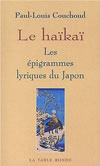
D. Sources of Influence and Transmission
19. Couchoud, Paul-Louis. ‘Haïkaï: Les èpigrammes poètique du Japon’. Les lettres, April 1906, pp. 189~98. Enlarged in Sages et poétes d’Asie. Paris: Calmann~Levy, 1916.
 |
||
| The work that ‘originated haiku in French’, in a new edition from Table Ronde, 2003. |
Couchoud’s study of haiku with translations helped shaped early Imagist understanding of the form. The renderings here of Buson (Ap) and of Moritake’s ‘fallen blossom’ (Ap) are the probable source for Flint’s translations (in A2), which in turn are the probable source for Pound’s knowledge of the Moritake poem in the famous derivation of the form of super-position from it (in BK12; though see also D13 and D15e6). In addition, Harmer (A51, p. 30) suggests that Hulme’s poems (see A3) ‘suggest, in rhythm or phrase, possible affinities with’ Couchoud. Miner credits Couchoud with ‘originating haiku in French’ (A25, p. 75). See also BB3a, CC1, and D21.

